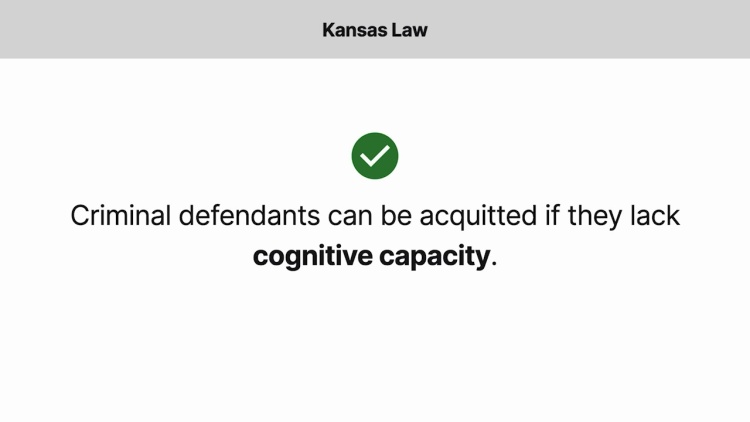Kahler v. Kansas
United States Supreme Court
140 S. Ct. 1021 (2020)
- Written by Robert Cane, JD
Facts
In 1995, Kansas modified its insanity-defense statute. The revised Kansas law provided that a criminal defendant could offer evidence of mental illness to show that he did not have the required criminal intent, or mental state, to commit the charged crime. Thus, the Kansas law recognized a lack of cognitive capacity regarding the nature and quality of a defendant’s conduct (i.e., a person did not know what he was doing when he committed a crime) as a valid insanity defense. However, the Kansas law provided that mental illness was not otherwise a defense to criminal liability. In other words, a lack of moral capacity, or an understanding that a person’s conduct was wrong (i.e., a person did not know right from wrong when he committed a crime), was not a valid insanity defense under Kansas law. Yet, at sentencing, a defendant could offer evidence that showed that his mental illness made him unable to understand the moral wrongness or criminality of his conduct as a reason to lessen his punishment. In 2009, Karen Kahler filed for divorce from James Kahler (defendant) and moved out of their home with their three children. James became distraught. Months later, James went to the home of Karen’s grandmother because his family was staying there. James entered the home and shot Karen twice. James allowed his son to flee. Subsequently, he shot Karen’s grandmother and his two daughters. All four people died. The next day, Kahler turned himself in to the police, and he was charged with capital murder. Kahler filed a pretrial motion regarding Kansas’s treatment of insanity defenses. Kahler argued that the Due Process Clause of the Fourteenth Amendment to the United States Constitution required the availability of an insanity defense for circumstances in which a defendant could not distinguish right from wrong due to a mental illness. The trial court denied Kahler’s motion. Kahler was convicted of capital murder. At sentencing, Kahler was permitted to offer evidence of his mental illness as a mitigating circumstance. The jury still imposed the death penalty. Kahler appealed.
Rule of Law
Issue
Holding and Reasoning (Kagan, J.)
Dissent (Breyer, J.)
What to do next…
Here's why 909,000 law students have relied on our case briefs:
- Written by law professors and practitioners, not other law students. 47,100 briefs, keyed to 997 casebooks. Top-notch customer support.
- The right amount of information, includes the facts, issues, rule of law, holding and reasoning, and any concurrences and dissents.
- Access in your classes, works on your mobile and tablet. Massive library of related video lessons and high quality multiple-choice questions.
- Easy to use, uniform format for every case brief. Written in plain English, not in legalese. Our briefs summarize and simplify; they don’t just repeat the court’s language.







